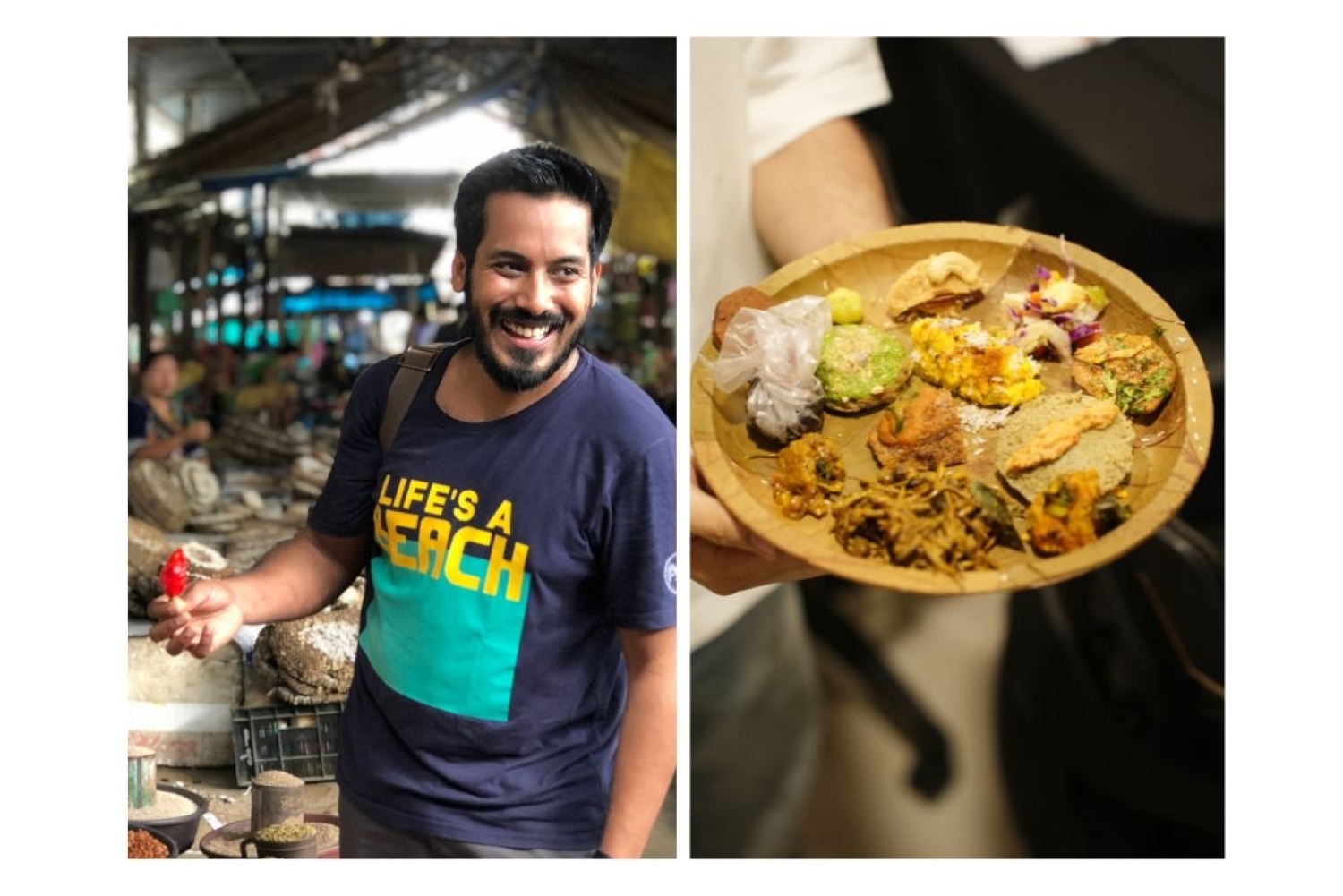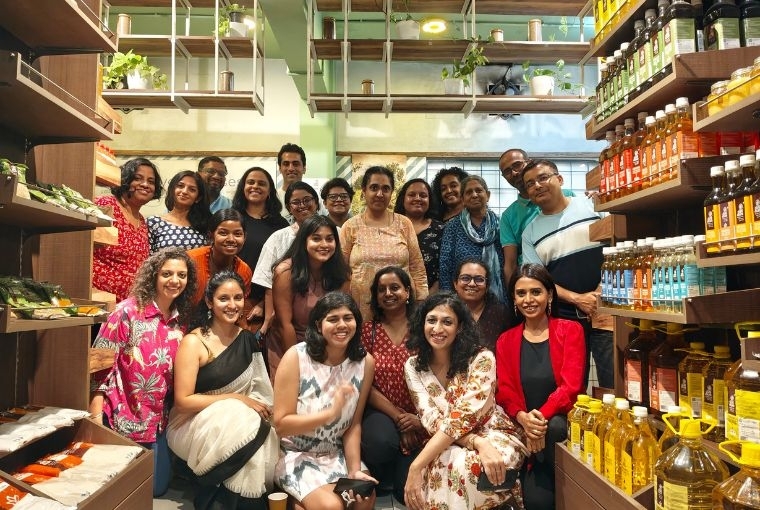
L: Photo by The Locavore, R: Photo by Shrubra Jain

L: Photo by The Locavore, R: Photo by Shrubra Jain
In 2022, Chef Thomas Zacharias stepped away from the restaurant world to start The Locavore, a platform and movement that works at the intersection of food, storytelling, and impact. Their ethos is simple: Doing Good Through Food. They collaborate with farmers, foragers, indigenous communities, researchers, home cooks, and eaters to explore how food connects us to climate, culture, memory, and each other. We’re in conversation with Chef about widening the lens—beyond the plate, beyond the restaurant—and creating space for care, community, and deeper engagement with where our food really comes from.
What drove you to start The Locavore? Take us right back to the beginning.
The Locavore was born out of a long and winding journey—one that started in my grandmother’s kitchen in Kerala, passed through the Culinary Institute of America in New York, the high-pressure world of Le Bernardin’s three-Michelin-star kitchen, and eventually brought me back to India, where I found myself traveling across states, villages, farms, forests, and homes.
After several years leading kitchens in Bombay, especially at The Bombay Canteen, I began to feel a growing restlessness. Yes, we were reimagining Indian ingredients and regional recipes—but something was missing. There was still a disconnect between the plates we served and the people, landscapes, and food systems behind them. I started asking myself harder questions: Who grows our food? What’s lost when a seed disappears? How do we honour traditional knowledge while still being creative? And, most of all, how do we tell these stories outside the fine-dining bubble?
You’ve documented countless food stories — can you share one that has stayed with you, something that changed the way you think about food?
One of the experiences that fundamentally shifted how I think about food happened in June 2019, in Jawhar village, Palghar, Maharashtra. I had travelled there with Shailesh Awate of OOO Farms, who introduced me to Sunil Bhoye, a rice conservationist, farmer, and member of the Kokni tribe. Sunil took us on a foraging walk through the nearby forest. It was peak monsoon. The paths were slippery, thick with undergrowth but Sunil moved with ease. Every few steps, he paused to show us a plant: tandalya, kurdu, keni—naming them, their nutritional properties, explaining how they’re cooked, and sharing how he learned to identify them from his parents and grandparents.
That day changed how I saw wild foods. It pushed me to get more involved not just in using them, but in standing alongside those who steward them. It eventually led to me getting a lot more involved in curating the Wild Food Festival, kickstarting the Wild Food Project, and nurturing what’s now a long-standing relationship with the Palghar community and the OOO Farms team. Every year since, we’ve returned to those forests, not just to forage, but to listen, to learn, and to honour what the land continues to teach us.

Local Food Club meet Bangalore, Photo by Shruti Agarwal
Tell us a little bit about the Local Food Club initiative. Where did the idea come from?
Years ago, I attended a Vipassana retreat—ten days of silence, completely free, run purely on generosity and shared commitment. That experience stayed with me. I wanted to build something similar in the world of food: a space that’s non-commercial, deeply inclusive, and led by the people who show up—not for credit, but for care.
So, in May 2025, we launched the Local Food Club—one of our most heartfelt and ambitious projects at The Locavore. It’s a free, decentralized, volunteer-led movement that brings people together around food, memory, and sustainability. On the first Sunday of every month, people across cities gather for a potluck shaped around a theme—like monsoon, memory, or sustainability. Everyone brings a dish and a story. The atmosphere is intentionally simple, but the impact runs deep—conversations around caste, climate, and foraging emerge over a shared table, strangers connect, and forgotten recipes come alive.
None of this would’ve been possible without the belief and support of the Rainmatter Foundation, who came on board early on. Their work focuses on climate action, regenerative agriculture, and systems change across India—and their partnership helped us root LFC not just in the joy of sharing food, but in a larger commitment to cultural and ecological resilience.
Food often intersects with crucial aspects of our identity like memory and belonging. What kind of community do you hope to harbour through LFC?
I hope LFC becomes a space where people feel seen, nourished, and connected—not just to each other, but to where they come from and the people growing their food and getting it to their table.
Food is one of the few things that holds memory, identity, and emotion all at once. A simple mango mor kuzhambu can transport someone back to their grandmother’s kitchen. A plate of bhutte ke kand can spark conversations about foraging, caste, or seasonal rhythms.
We’ve had moments where strangers became friends, people cried while sharing memories, or someone brought a dish from their village that hadn’t been cooked in years. That’s the kind of belonging we’re hoping to nurture—one that’s gentle, real, and enduring.
The landscape of storytelling around food in India has been growing endlessly, as of late. What do you hope to see more of?
I’d love to see storytelling that goes beyond the glossy and the grand. Food in India isn’t just about chefs and restaurants—it’s about farmers, seed savers, tribal communities, fisherfolk, home cooks, and everyday eaters. And I hope more stories are told by them, not just about them.
We need narratives that ask uncomfortable questions, challenge broken systems, and open up new ways of thinking. That celebrates the quiet, layered beauty of regional food. That honour land, labour, and lineage. And we need to think across disciplines—because food is inseparable from caste, climate, capitalism, and culture.
At The Locavore, we’re trying to build a storytelling ecosystem that reflects all of that. One that’s less about nostalgia and more about reimagining food futures. Because the stories we tell about food shape not just what we eat, but how we grow it, who gets to access it, and what kind of world we’re building around it.
Words Neeraja Srinivasan
Date 26-8-2025